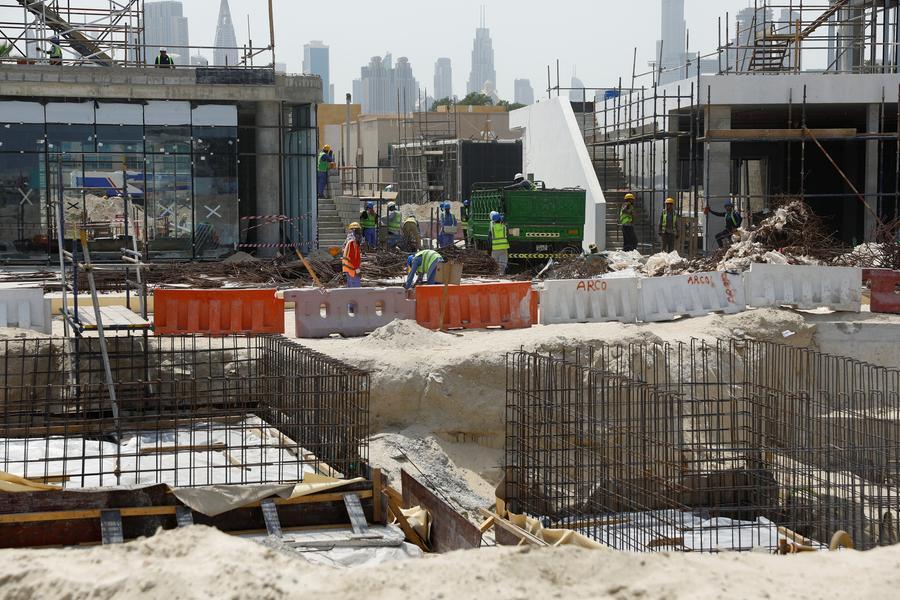
The Saudi and UAE construction markets remain among the strongest worldwide, driven by robust workloads and positive sentiment, according to the Q3 2024 Global Construction Monitor by RICS.
The UAE’s Construction Sentiment Index (CSI) recorded a net balance of +55, its highest since RICS began tracking the country in 2018, the quarterly guide to the trends in the construction and infrastructure markets stated.
Saudi Arabia achieved +61, a slight dip from the second quarter. “Whilst slightly lower than +64 in the second quarter, the figure remains firmly in expansionary territory,” the Monitor said.
Both countries outperformed the Middle East and Africa (MEA) region’s CSI of +28 (up from +24 previously).
On the other hand, the MEA region as a whole outperformed the Americas, Europe, and APAC, with its residential, non-residential, and infrastructure sectors demonstrating positive trends in current workloads and strong 12-month growth expectations. Infrastructure was the top sector in both current and future workloads.
APAC’s CSI of -2 (down from +7 in the second quarter) represented the worst reading across the region since 2020. Europe recorded a reading of +7 compared to last quarter’s figure of +12 while Americas with CSI of +18 remained in positive territory despite much stronger readings of +27 and +32 seen in the second and first quarters respectively
Key challenges
Despite their strengths, both Saudi and UAE markets face some headwinds. RICS said in the UAE, fluctuating oil prices driven by geopolitical tensions have dampened investor confidence, leading to some delays and cancellations of projects, particularly those dependent on government or oil-related funding.
High levels of demand for professionals continue to impact the market with UAE respondents identifying quantity surveyors as the most sought-after professionals, followed by skilled tradespeople and site managers. Shortages of even unskilled labour persist, fueled by rising project demands.
These pressures are accelerating pre-contract and procurement processes, leading to rushed agreements and increasing the risk of disputes and strained contractual relationships.
A Dubai respondent highlighted that the concurrent development of major projects in Saudi Arabia is impacting the availability of competent contractors and subcontractors in the rest of the region. An Abu Dhabi respondent said framework agreements are increasingly being used by large developers to secure supply chains.
Obstacles cited by respondents in Saudi Arabia, especially in the context of giga projects, include buildability of iconic designs, shortage of internationally competent contractors, underdeveloped local supply chain networks, lack of reliable supply chain partners and issues in securing performance securities by contractors from banks.
Profit margins under pressure
Profit margins in the MEA have trended downward, with a net balance of -24 percent this quarter compared to -4 percent in the previous quarter, RICS said. However, optimism persists, with a net balance of +20 percent expecting margin improvements over the next 12 months.
Contractors are facing price wars and demanding clients, which have driven their profit margins to minimal levels, a Dubai respondent said.
Material costs remain the most cited challenge (73 percent of MEA respondents) pushing former no 1, Financial constraints to the second place (72 percent). However, the proportion of respondents reporting difficulties acquiring materials declined from 49 percent to 35 percent in the third quarter.
RICS Senior Public Affairs Officer, Abdullah Akaish suggested streamlining the recruitment process for foreign talent could help companies mitigate delays and meet heightened demand without compromising quality.
“RICS advocates for greater collaboration between developers, contractors, and consultants to manage timelines effectively, reducing risks associated with hurried contracts,” he said.
Despite these challenges, both Saudi Arabia and the UAE construction markets exhibit resilience, with long-term confidence supported by a strong workload and positive growth prospects, according to the Monitor.
(Writing by Anoop Menon; Editing by SA Kader)
(anoop.menon@lseg.com)
Subscribe to our Projects’ PULSE newsletter that brings you trustworthy news, updates and insights on project activities, developments, and partnerships across sectors in the Middle East and Africa.









